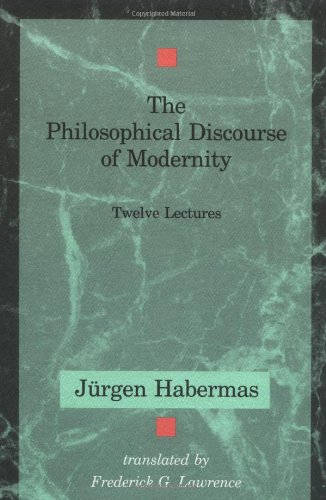The Philosophical Discourse of Modernity book download
Par fulcher robert le mercredi, octobre 12 2016, 21:41 - Lien permanent
The Philosophical Discourse of Modernity. Frederick Lawrence, Jurgen Habermas, Thomas McCarthy

The.Philosophical.Discourse.of.Modernity.pdf
ISBN: 0745608303,9780745608303 | 456 pages | 12 Mb

The Philosophical Discourse of Modernity Frederick Lawrence, Jurgen Habermas, Thomas McCarthy
Publisher: Polity Press
Discourse is an activity designed in order to bring ideas down from the proverbial heavens and affect the course of our lives, our destinies, and our polis. The Philosophical Discourse of Modernity: Twelve Lectures, trans. "Labor and Interaction: Remarks on Hegel's Jena Philosophy of Mind. In modernity philosophy is, for the most part (compare HS 28, where Foucault adds some qualification), not the activity of ethical transformation that aims at the existence transformed by truth. The single most important reading of the first generation Frankfurt School is Jürgen Habermas' The Philosophical Discourse of Modernity . The Philosophical Discourse of Modernity: twelve lectures, Frederick Lawrence (trans.). Title: The Philosophical Discourse of Modernity. Rewriting the soul: Multiple personality and the sciences of memory. The roots of modernity get at the philosophical discourses of enlightenment. Moral Consciousness and Communicative Action, 1990. The Philosophical Discourse of Modernity book download. No one else in the meeting had heard of Habermas. Of late, numerous dialogues have been made concern with the width of currents of modernity. The philosophical discourse of modernity. Thus, Habermas's project is rooted in modernity and Enlightenment with claims of universalization of action norms (discourse ethics) to institutionalize democratic deliberative polity based on the rule of law. The Philosophical Discourse of Modernity, 1987. As an example of this contrast, I refer to the famous critique against Foucault leveled by Habermas in The Philosophical Discourse of Modernity: Twelve Lectures (Habermas, 1987). Foucault therefore asserts that the perception of the dangerous physical and spiritual effects of unrestrained sexual activity led to a moral and medical discourse about sex different in kind than that of ancient Greek ethical discourse. Reflections, a pretty comprehensive blog on Jurgen Habermas's work when i came upon an article by Thomas Biebricher, which examines Habermas' interpretation of Foucault in the Philosophical Discourse of Modernity. <>The obvious starting point for the analysis of the Habermas – Derrida debate is Habermas' 1987 book The Philosophical Discourse of Modernity in which one 'lecture' and one 'excurses' deal with Derrida.